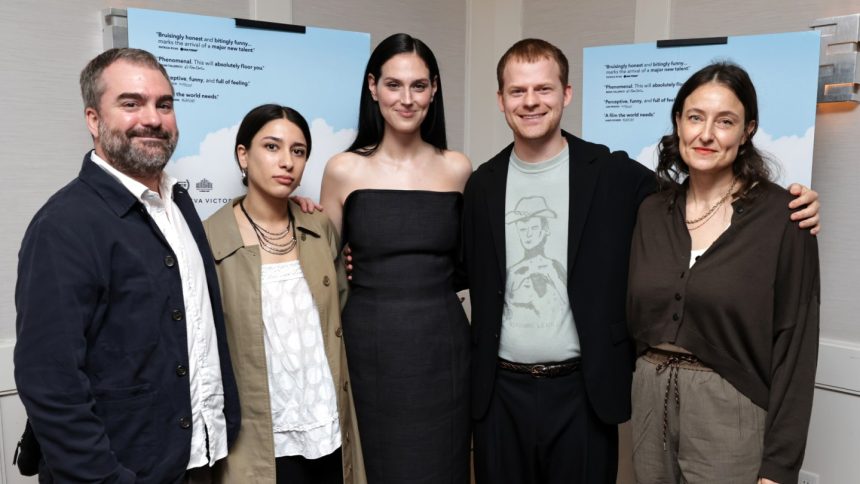Eva Victor and Adele Romanski Want More Mental Health Coordinators on Set: “You Never Know When Something’s Gonna F*** Someone Up”
Eva Victor and their Sorry, Baby producer Adele Romanski were joined by comedian Rose Matafeo at an Edinburgh International Film Festival event on Saturday.
The trio made an appearance at Tollcross Central Hall for a discussion around the making of Victor’s fest-favorite feature and EIFF’s opening night film.
The movie follows Victor as Agnes, a literature professor coming to terms with a traumatic life event. While Agnes navigates her way through the mental and physical hurt caused, she leans on her best friend Lydie (Naomi Ackie), who reveals to Agnes she is expecting a baby via a sperm donor. The film, also starring Lucas Hedges, Louis Cancelmi and John Carroll Lynch, premiered to rave reviews at Sundance this year before A24 picked it up for a June theatrical release.
One element Matafeo (mastermind behind the BBC’s brilliant romantic series Starstruck) was keen to dissect was Victor and Romanski having both an intimacy coordinator and a mental health coordinator on set.
You Might Also Like
“I don’t know if that’s something that’s happening yet,” Romanski, best known for producing Moonlight (2016) and Aftersun (2022) said about onboarding a mental health coordinator, “but it isn’t happening that much in the States, to be honest.”
“Maybe you’re the boom operator, and you come to work every day and there’s no way of knowing what you’re about to be exposed to,” she continued. “There’s variables across your day-to-day job that you can’t anticipate how it might affect you or someone else in a unique way based on their lived experience. I wish it was a position we just had on our staff, the same as you have your camera assistants and your craft service person, because you never know when something’s gonna fuck someone up, you know?”
Victor clarified it was the film’s intimacy coordinator, Kayleigh Kane, who helped choreograph a scene where Agnes has a panic attack. “The biggest lesson from her that I learned that was very comforting, was [that] so much of making a scene feel really intimate is about breath and de-sexualizing it,” they told the audience.
Romanski added that she doesn’t understand why there’s pushback against the role in Hollywood and on international film sets: “I’ve never had a director personally push back. I think it’s welcome. The support is welcome. Those scenes are difficult for those in front of and behind the camera, and so having somebody there to help break it down, professionalize it, is [something] I find wanting and really craved from my directors. Who doesn’t want that?”
Victor said: “There’s also no point in making a movie about trying to find safety and not feeling safe while doing it. Like, what would that be?”
Among more discussion about the film’s score, messaging and casting decisions, Victor revealed they have overcome a bout of imposter syndrome. “I went to a school where there was a very specific person who was allowed to try directing, and I didn’t feel like I was part of that,” they said. “I thought that it had to be this thing where you were born wanting to do it… I discovered filmmaking in my mid-20s, and a lot of people go to school for filmmaking much before that. So I felt late, and I felt fraudulent, and I think a lot of those feelings masked a real desire to do it.”
“It took some peeling back of layers,” they continued. “And, honestly, just asking the simple question of: ‘What do I see when I close my eyes?’ Once I realized [that] I want to figure out what this looks like, all I needed was tools.”
Romanski admitted she was in need of one more coffee when Matafeo asked her to answer: how hard is it to make a feature film these days?
“I am finding it very, very difficult right now for films that live at the $10 million [budget],” she said. “It’s okay to take the risks on interesting cast dynamics or new voices or debut directors, and that’s working. But when you want to get something with a little bit more scale, a little bit more scope, actors who we know and love, directors who have made work before, people are feeling like there’s no bottom on the theatrical market right now. And because of that, that space is very scary.”
“I mean, I’m not scared about it, just to be clear,” she added, “but it’s scary to the people who have to take the risk financially.”
Edinburgh International Film Festival 2025 runs Aug 14-20.


